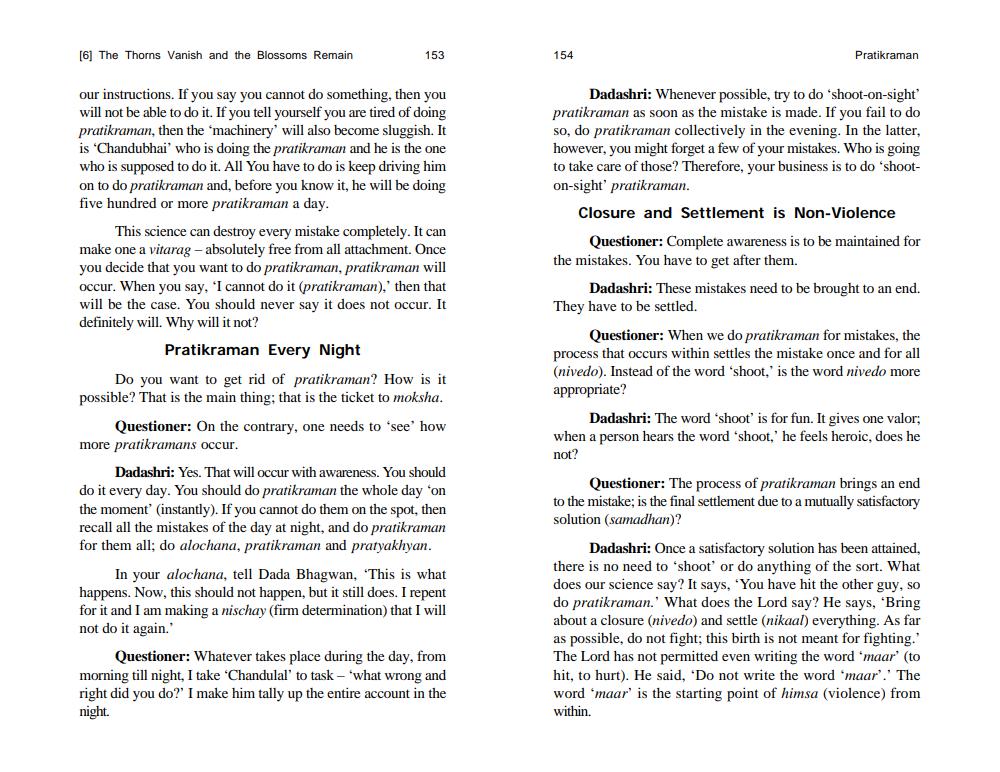________________
[6] The Thorns Vanish and the Blossoms Remain
153
our instructions. If you say you cannot do something, then you will not be able to do it. If you tell yourself you are tired of doing pratikraman, then the 'machinery' will also become sluggish. It is 'Chandubhai' who is doing the pratikraman and he is the one who is supposed to do it. All You have to do is keep driving him on to do pratikraman and, before you know it, he will be doing five hundred or more pratikraman a day.
This science can destroy every mistake completely. It can make one a vitarag - absolutely free from all attachment. Once you decide that you want to do pratikraman, pratikraman will occur. When you say, 'I cannot do it (pratikraman),' then that will be the case. You should never say it does not occur. It definitely will. Why will it not?
Pratikraman Every Night
Do you want to get rid of pratikraman? How is it possible? That is the main thing; that is the ticket to moksha.
Questioner: On the contrary, one needs to 'see' how more pratikramans occur.
Dadashri: Yes. That will occur with awareness. You should do it every day. You should do pratikraman the whole day 'on the moment' (instantly). If you cannot do them on the spot, then recall all the mistakes of the day at night, and do pratikraman for them all; do alochana, pratikraman and pratyakhyan.
In your alochana, tell Dada Bhagwan, 'This is what happens. Now, this should not happen, but it still does. I repent for it and I am making a nischay (firm determination) that I will not do it again.'
Questioner: Whatever takes place during the day, from morning till night, I take 'Chandulal' to task - 'what wrong and right did you do?' I make him tally up the entire account in the night.
154
Pratikraman
Dadashri: Whenever possible, try to do 'shoot-on-sight' pratikraman as soon as the mistake is made. If you fail to do so, do pratikraman collectively in the evening. In the latter, however, you might forget a few of your mistakes. Who is going to take care of those? Therefore, your business is to do 'shooton-sight' pratikraman.
Closure and Settlement is Non-Violence
Questioner: Complete awareness is to be maintained for the mistakes. You have to get after them.
Dadashri: These mistakes need to be brought to an end. They have to be settled.
Questioner: When we do pratikraman for mistakes, the process that occurs within settles the mistake once and for all (nivedo). Instead of the word 'shoot,' is the word nivedo more appropriate?
Dadashri: The word 'shoot' is for fun. It gives one valor; when a person hears the word 'shoot,' he feels heroic, does he not?
Questioner: The process of pratikraman brings an end to the mistake; is the final settlement due to a mutually satisfactory solution (samadhan)?
Dadashri: Once a satisfactory solution has been attained, there is no need to 'shoot' or do anything of the sort. What does our science say? It says, 'You have hit the other guy, so do pratikraman.' What does the Lord say? He says, 'Bring about a closure (nivedo) and settle (nikaal) everything. As far as possible, do not fight; this birth is not meant for fighting.' The Lord has not permitted even writing the word 'maar' (to hit, to hurt). He said, 'Do not write the word 'maar'. The word 'maar' is the starting point of himsa (violence) from within.




